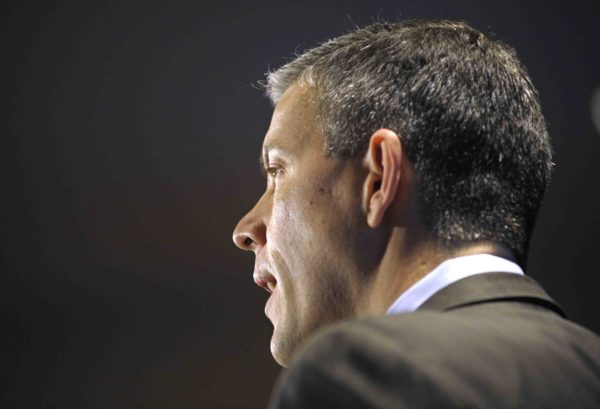Education Secretary Arne Duncan slammed Congress for ‘ignoring evidence’ and ‘distorting positions.’ It’s a criticism that could be applied to him, too.

In a Sept. 30 speech at the National Press Club in Washington, D.C., Education Secretary Arne Duncan said that “too many [Beltway] inhabitants … are so supremely confident in their perspective that they have stopped listening to people with a different viewpoint.”
Does anyone else see the irony in this remark?
Duncan was arguing that education stakeholders from both sides of the political aisle need to come together to improve U.S. public education, and on this point, I would agree.
But he also spent a significant portion of his speech defending the Obama administration’s education policies in ways that suggest he, too, has stopped listening to his critics.
Consider the issue of poverty, and its devastating effects on schooling. Outside Washington, “people are not arguing in 140 characters or less about whether or not we need to fix poverty before we can fix education. That, like so many debates in education, is a false choice,” Duncan said. “Of course, we will keep fighting poverty. … But we can’t use the brutal reality of poverty as a catch-all excuse to avoid responsibility for educating children at risk.”
This is a “straw man” argument: No one who points out the clear correlation between poverty and academic success is seeking to “avoid responsibility” for educating kids. It’s obvious from Duncan’s remarks that he still doesn’t understand his critics’ concerns.
In a column written for eSchool News before Duncan gave his speech, Dan Domenech, executive director of the American Association of School Administrators, notes that “the models that states and districts were forced to adhere to by Race to the Top [RTTT] ignore the poverty factor.”
(Next page: Why Duncan is wrong on poverty … and other issues)
Rather than seeking to address “out-of-school influences that affect learning,” RTTT focuses on “extraneous variables,” Domenech writes, such as “the evaluation of teachers and principals—and the turning over of schools to charters and private management firms.”
RTTT doesn’t just ignore the problem of poverty and its effects on learning; its funding model actually makes the problem worse, Domenech argues.
“The Elementary and Secondary Education Act was an attempt to level the playing field,” he writes. “A formula was created to distribute federal dollars to schools based on their degree of poverty. But this concept recently has been altered by the Obama administration through the use of competitive grants [like RTTT], awarded to states and school districts that comply with the administration’s policy directives.”
To “break the pernicious cycle of poverty,” policy makers must ensure that schools in high-poverty areas have resources that are comparable to those in wealthier communities, Domenech concludes. That’s not making excuses—it’s advocating for sound education policy.
Duncan also seems tone-deaf to criticism of the Obama administration’s school-choice initiatives.
“In the real world, parents just want great public schools for their children,” he said. “Most don’t really care if it’s a traditional public school, a magnet school, or a charter school. They just want a school that is safe, and that challenges students to excel and makes them feel cared for.”
That’s true; most parents don’t care about the traditional-vs.-charter debate. But supporters of a high-quality education for every child do.
They know, for instance, that charter schools often use various tactics to shape their enrollment so that so-called “problem students”—those with special needs, low test scores, or other challenges—are under-represented. That leaves the traditional public schools to educate these students, but often with fewer resources, because they have lost too many other students to charters.
I’m not arguing that students and their parents shouldn’t have more choices. But basing education policy around a competition for scarce resources is hurting the very schools that need help the most.
Duncan made some good points in his speech. His pushback against the notion that unions are impediments to reform was a welcome gesture, as he gave examples of how the AFT and the NEA have been “partners” in leading change. He called for more funding for pre-school education and teacher preparation, noting that other countries “get it” by investing heavily in these areas. And he hit Congress hard for the “dysfunctional politics” that have kept it from carrying out its “core responsibilities” in education.
“Instead of … actually listening to each other with respect, with humility, and with a genuine interest in finding common ground, many of these people are just talking past each other,” Duncan said. “They are ignoring plain evidence and deliberately distorting each other’s positions.”
While that’s certainly true of our nation’s lawmakers, the same could be said for Duncan himself.
Follow Editor in Chief Dennis Pierce on Twitter: @eSN_Dennis.
See also:
Why releasing teacher ‘rankings’ is a bad idea
- Can technology help schools prevent AI-based cheating? - April 14, 2023
- How to ensure digital equity in online testing - July 6, 2022
- ‘Digital skills gap’ threatens innovation - May 30, 2022


